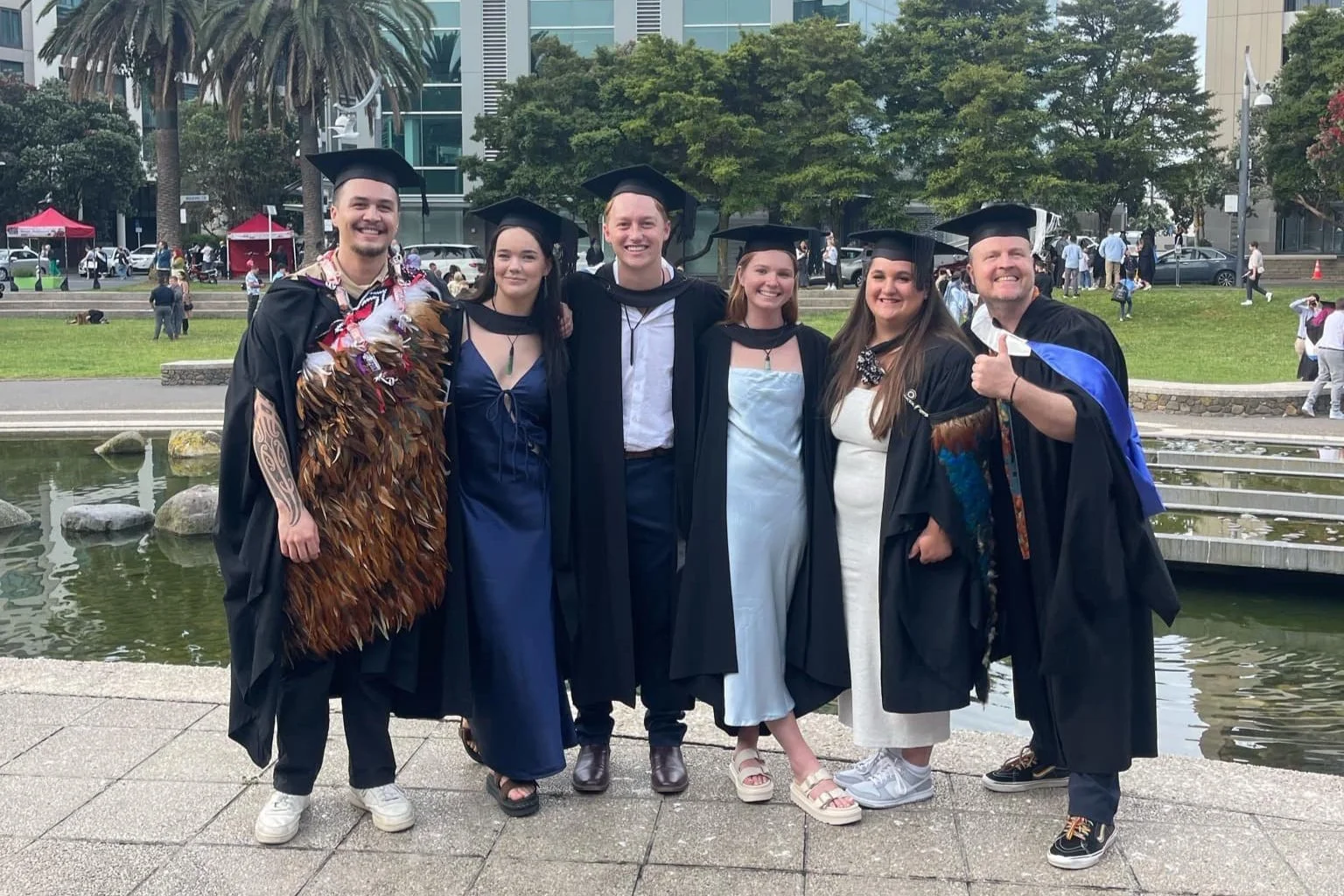Elsie McRobb
Kia ora ko Elsie tōku ingoa. I whakapapa to Ngāpuhi, specifically the Hokianga and Whirinaki regions. I grew up in Ōtautahi before moving to Tāmaki Makaurau to study paramedicine.
Elsie (left) with friend and fellow MAPmedic tauira, Kyah (right).
What inspired you to pursue a degree in paramedicine?
Like many others, I was initially drawn to paramedicine because I wanted to work alongside like-minded people to provide care to those in need. I’ve always had a passion for helping others and knew I would end up in healthcare, though I hadn't considered paramedicine until my Nan mentioned it to me.
As I progressed through my studies, I came to appreciate the diversity of the role—the wide range of cases, varying acuity levels, and the balance between structure and unpredictability. Each semester at university reinforced my motivation to continue, and seeing my peers and fellow MAPmedics whānau graduate and thrive as paramedics or EMTs was a huge source of inspiration.
What were the highlights of your paramedicine degree?
One of the biggest highlights has been meeting people from all walks of life—not just patients but also fellow students and colleagues. I was fortunate to form some of my closest friendships through MAPmedics, and these friends became my whānau at university. Now, as we begin our careers as paramedics, we get to continue this journey together, which I’m incredibly grateful for.
The degree itself is well-balanced, blending both theory and hands-on practical learning, with placements every semester. I appreciated this structure because it prevented burnout from too much theory while also allowing me to apply my knowledge in real-world settings. The variety of experiences and the people I’ve met along the way have been the most rewarding aspects of my journey through paramedicine.
How did MAPmedics support you during your studies?
I first joined MAPmedics in Semester Three and attended weekly sessions, where we would share kai and work on whatever we needed support with. Studying in a large cohort can be overwhelming, but MAPmedics provided a welcoming space where I could ask questions—whether to senior students, lecturers, or peers. The sessions covered everything from essay writing to practical scenario training and placement debriefs. The lecturers were always supportive and available to help. As I progressed through my degree, I had the opportunity to give back by mentoring students in earlier semesters.
Beyond academic support, MAPmedics was also a vital source of mental and emotional support. Knowing I could debrief with trusted lecturers and peers made a huge difference. It was reassuring to have a network that not only provided academic guidance but also looked out for one another’s well-being.
Elsie (second from left) with other MAPmedics tauira and lecturer (right).
You’ve won a couple of awards—could you tell us about them?
At the pinning ceremony last year, I was honoured to receive two awards, one of which was Te Pītau Whakareia o te Waka. This award recognises leadership through manaakitanga and peer support. For me, manaakitanga has always been central to my journey in paramedicine. MAPmedics played a huge role in my success, and I knew how valuable it was to have support from tuakana when I first joined. Being able to step into that role myself and give back was incredibly meaningful. The desire to help people is what drew me to paramedicine in the first place, and this award reflected another way I could do that—through mentorship and support.
How has MAPmedics helped you connect with your Māori culture?
Growing up, I had little awareness of my Māoritanga and only started learning about my tūpuna and whakapapa in high school. When I started at AUT, I was encouraged to join MAPmedics, which became a space where I could further embrace my culture.
Through MAPmedics, I found a supportive environment where whanaungatanga and manaakitanga were central values. I met students who had grown up deeply connected to their Māoritanga, as well as others who, like me, were just beginning their journey. Regardless of where we were in that process, MAPmedics created a whānau where we could support one another and grow together.
Elsie (left), with close MAPmedic friends, Dante (centre) and Shayla (right).
What are your plans now that you’ve graduated?
After graduating, I worked for Hato Hone St John in the Hauraki/Coromandel region for a few months before securing a position with the South Central Ambulance Service in Milton Keynes, UK. I’ve recently moved over and plan to work as a paramedic here for a few years, gaining experience while also travelling with friends.
I’m fortunate to be making this move with some of my closest friends from MAPmedics, which makes the transition even more exciting. As for the long-term future, I’m not entirely sure yet, but I do know I’ll eventually return to university for postgraduate studies.



